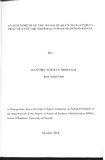| dc.description.abstract | The generation process in thermal power plants has great effect on the quality of final product generated by each plant. This means that the emphasis of research and practice ofTQM in power generation should shift from focusing on the final product to focusing on the generation process. Not only the high quality of product and service but also the high level of quality control of the whole energy generation process ensures the competitive advance. The essence of competitive advantage is not simply pursuing product quality and process quality, but the performance of the whole energy generation system.
The purpose of this paper was to explore application of the TQM principles in electrical energy generation management in thermal power plants in Kenya. The objective of the study was to assess the application of TQM principles in electrical energy generation management in thermal power plants in Kenya. Specifically, the study assessed the continuous improvement of systems, leadership and management practices, determined the extent to which quality culture entrenched in the organization; and established the level of focus on customers and involvement of staff in decision making.
The descriptive research design was adopted to assess the quality management issues affecting performance of thermal power plants in Kenya. The study targeted the five thermal power plants in Kenya. These are Kenya Electricity Generating Company (KenGen) which accounts for close to 70% of generation; Iberafrica Power (EA) Ltd; Tsavo Power Company Ltd; Mumias Sugar Company Ltd; and Rabai Power Ltd. Five representatives were randomly selected from each of the five power plants to make a total sample size of 25 respondents. A questionnaire was used to collect primary data.
Descriptive statistics in the form of pie charts, contingency tables and bar graphs were used to describe the data. The Mean helped to determine the average score for each variable in each thermal plant and that of the industry. Pearson correlation was used to determine if there is linear relationship between any of the tested variables in the thermal electrical power generation. The results revealed that there is implementation of TQM principles which has a strong impact on the organisation's performance. From results of Pearson Product Moment Correlation Coefficients on TQM principles and quality there is a significant statistical relationship between TQM principles and quality and hence overall performance of thermal power plants in Kenya.
Further, it can be concluded that thermal power plants have embraced continuous improvement of systems, leadership and management practices principles of TQM. These have been effective in influencing performance of thermal power plants. This shows that employees are confident in the organizations leadership and that their leaders have skills to lead. In addition, the respondents reported that managers have earned employee respect and that they perceive fairness in participation and involvement. From these results, one can conclude that employees have confidence in the organization and its management.
Implementation TQM emphasizes on culture of quality and therefore it can be concluded that power plants have embraced culture of quality. However, there are certain sections of organization design that inhibits its quality. Finally the findings indicate that there is customer focus and staff involvement in decision making in thermal power plants in Kenya. | en_US |

